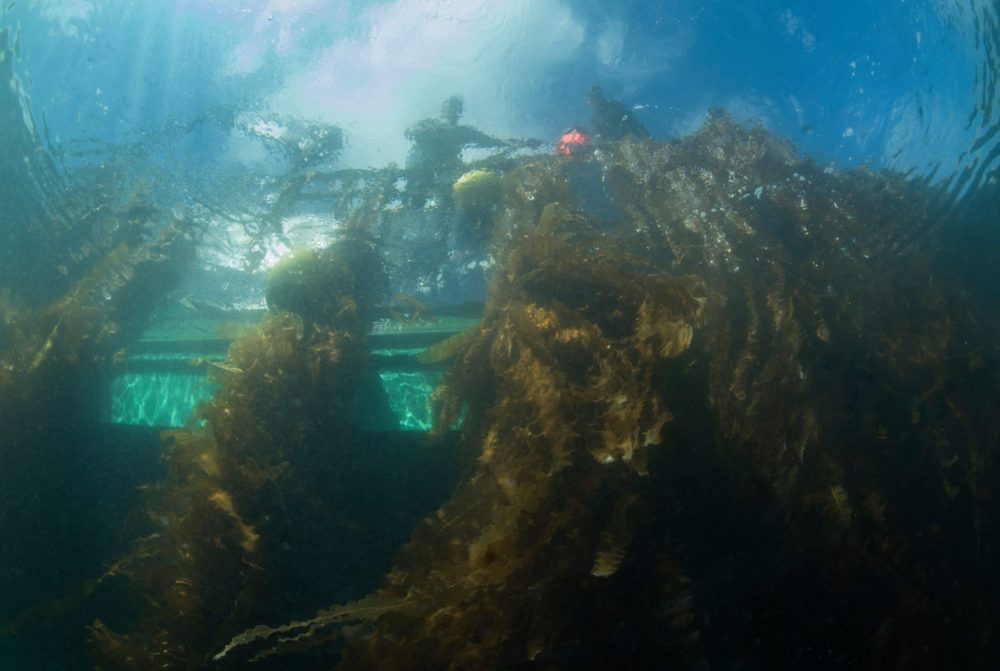While reporting on the quest for sustainable seaweed last year, I alighted on the Faroe Islands, a remote archipelago in the North Atlantic. Here, I met the team at Ocean Rainforest, headed up by veteran Faroese ‘algae-preneur’ Olavur Gregersen. His team were busy trying to master two tough tasks that still blight the prospect of sustainably farming seaweed: one, devising offshore cultivation systems that won’t get swept away by storms; two, designing harvest and processing facilities that are less labor intensive.
Now, Gregersen says, his firm has secured $1.5 million in funding to further these twin aims at a larger scale. The round is led by the World Wildlife Fund (WWF), which has invested $850,000. The rest comes from a mix of existing Faroese backers and board members, including Gregersen himself. In a statement, WWF president and CEO Carter Roberts described his team’s investment as a response to environmental pressure from rising global demand for food, fiber, and fuel. “Seaweed cultivation holds the potential to reduce these pressures and contribute to a more balanced relationship with nature,” he said.
Seaweed’s potential
The world of ‘algae-neering’ is still fraught with technical or financial flops, not least the recent bankruptcy of California’s Catalina Sea Ranch. Yet advocates of farming macroalgae — or seaweed, as it is more commonly known — make a strong theoretical case. Its cultivation needs no freshwater, arable land, fertilizers, or pesticides. It can have a positive impact on biodiversity and fish farming. From a carbon sequestration perspective, seaweed is extremely efficient at absorbing CO2 from the ocean and reducing acidification. Its final products are in high demand in the world of cosmetics, fashion, plastic replacements, pharmaceuticals, alternative proteins, biofuels, fertilizers, and animal feed.
Then again, detractors often point to intensive labor in its harvesting, limiting it to areas where labor is cheap and plentiful. It faces many of the same technical, regulatory, and insurance risks that are always going to be associated with offshore activities. Many producers today attempt to circumvent these issues by harvesting from wild stocks – a process that can have a damaging effect on the seabed and has less guarantee of quality control. Here, the Norwegian seaweed company Alginor has developed combined harvesting and processing technology called AORTA (Alginor’s Ocean Refining Total utilising Application) to make this process a little cleaner, leaner, and greener.
“All human activity in the ocean has a level of risk,” said Paul Dobbins, WWF’s senior director of impact investing and ecosystems services. He noted how Ocean Rainforest farms multiple species of native seaweeds as a safeguard against monoculture – an accusation leveled at some seaweed farms in Asia.
Conservation finance
Dobbins said this is the first of multiple planned investments by WWF to support innovation across the farmed seaweed value chain.
“Impact investment is a new tool in our conservation finance strategy, but we plan to investigate future investments in other fields that also accelerate changes needed for the health of people and planet,” he said.
Another, more established force behind novel seaweed cultivation techniques — though not one so stridently conservationist in tone — has been the Advanced Research Projects Agency – Energy (ARPA-E).
Its US government mandate is to accelerate “transformational technological advances in areas that industry by itself is not likely to undertake because of technical and financial uncertainty.” ARPA-E has recently tapped Ocean Rainforest to follow through on a project initially spearheaded by the now-defunct Catalina Sea Ranch. Here, it will partner with Primary Ocean and Hortimare on a three-year open ocean cultivation project for giant kelp in California.
Gregersen said that the coastal regulations are “much less favorable” in California as compared to the Faroes, making for a different type of challenge for the startup.
On seaweed applications, Gregersen said his investors had expressed interest in the macroalgae’s role as a feed supplement to reduce methane emissions from cattle.
This chimes with another seaweed startup in the Nordic region, Sweden’s Volta Greentech, which raised a $500,000 round in May from investors like Claes Dinkenspiel and the Kjell & Märta Beijers Foundation. In contrast to Ocean Rainforest, Volta is designing onshore production systems, mapping out optimal growing conditions for indoor algae from a lab in Stockholm. The team’s production recipes are set for deployment. Over the next few months, Volta plans to expand to a pilot location in Lysekil on Sweden’s west coast; the facility is already completed with piped sea water, and all necessary approvals have been secured to start cultivation.
Algae tech, further afield
Other startups in the algae space are looking at faster ways to grow seaweeds tinier cousins: microalgae. You can read AFN‘s deep dive into the booming, blooming world of microalgae here. Some scientists are looking to take algae even further afield.
Research published in the journal Nature Plants describes scientists using gene editing to introduce microalgae proteins into tobacco plants, increasing their ability to convert light into chemical energy and reducing their water requirements. The researchers from the UK’s University of Essex want to adapt the technique to other crops, with cowpea, rice, and soybean top of their list.
Algae may even have a role to play in the fight against Covid-19, with recent research suggesting that certain algae-derived chemicals appear to inhibit the spread of the coronavirus more effectively than existing drugs.





